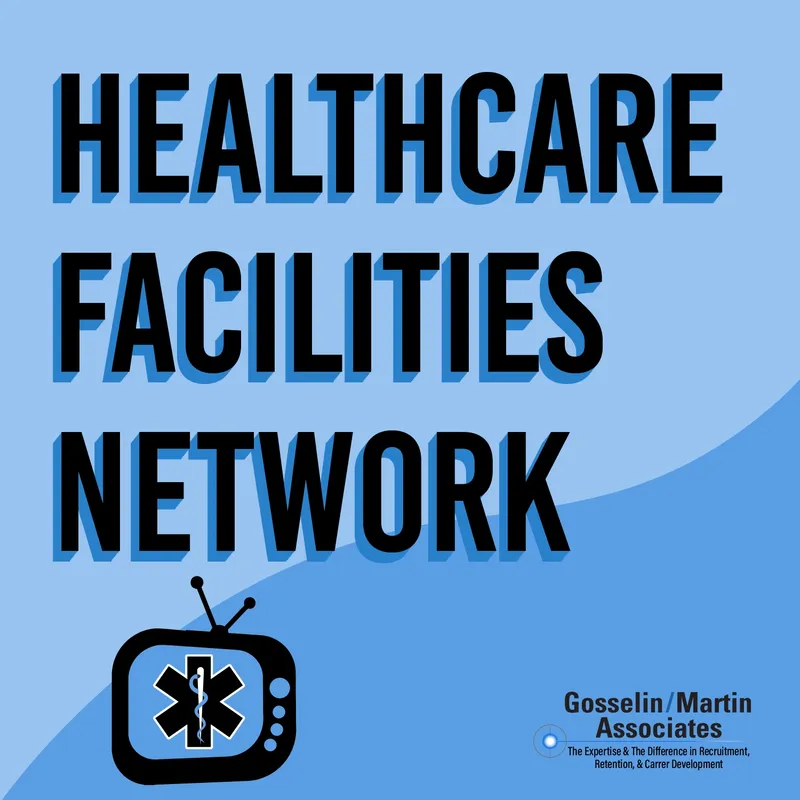For more than 17 years Gosselin/Martin Associates has assisted hospitals and hospital systems across the United States in locating, hiring, and developing top talent in healthcare facilities management.
Gosselin/Martin Associates are experts in the healthcare industry with experience in recruiting, succession planning, and education, we even created our own YouTube channel.
The mission of HFN is simple: Increase the visibility of the facilities management role by any means necessary, informing, educating, and boosting awareness that this rewarding career is open and available to all Healthcare Facilities Network.
“Gosselin/Martin Associates is the only national search firm with a distinct and specific focus on healthcare facilities management roles. They bring an understanding of the profession that can bring strong value to all of us. Expediting this search and selection is a priority and getting the right person in the role is extremely important. Gosselin/Martin Associates already knows the candidate network in place, which will assist in moving the process along quickly and with a targeted focus.“
-David Duncan, System Vice President of Facilities & Support Service, Care New England
No two days alike
When somebody asks a health care facilities management professional what they do in their job, the answer is neither simple nor easy. Employees in this role, from the plumber working in a patient’s room to the vice president sitting in the boardroom, perform various planned and unplanned tasks daily. Facility management professionals impact and touch every inch of a hospital care.
No two days are alike in healthcare facility management.
Choose healthcare facilities management for a rewarding career
If you want a mission-based career and like helping others, and you don’t like to be bored, then healthcare facilities management is your career.
- Hospital doors remain open during disasters such as hurricanes, blizzards, earthquakes, and tornadoes due to the efforts of facilities management.
- Healthcare facilities management professionals provide a safe environment so doctors and nurses can provide their life-saving care.
- Facilities professionals interact with more people across the hospital than just about any other hospital employee.
- All who enter the hospital depend on the efforts of the healthcare facilities management professional – they keep the building cool in the summer and warm in the winter.
What skills does a healthcare facilities management professional need?
- Strong technical knowledge (mechanical, electrical, plumbing, heating, cooling)
- Visibly lead and inspire confidence in others.
- Problem-solve daily
- Plan and prioritize effectively, while multitasking.
- Provide specific, calm, and effective leadership, especially during crisis
- Serve with a sense of mission and passion that supports patient care.
- Communicate well and often to provide an efficient environment
What types of buildings does a healthcare facility management professional manage?
- Hospitals
- Clinics
- Long-term care centers
- Behavioral health hospitals
- Medical office buildings (MOB) / office buildings
- Surgical and Ambulatory Surgical Centers
- Substance recovery centers
- Dental facilities
- Offsite Minute Clinics
- Health Sytems
“Thank you for the class. I have gained takeaways and will be sure to pass on the information provided to members of our staff. You make a great team with personnel insight, positive approach, and a willingness to share and listen.”
Kevin Maurer, Head, Facility Department, Naval Health Clinic, Hawaii
What are daily operations for healthcare facility management professionals?
- Maintain hospital operations and safety
- Respond to customer calls and perform work order management
- Provide preventive maintenance on equipment (mechanical, electrical, plumbing, medical gas) on a regular and scheduled basis
- Ensure proper operations of Heating, Ventilation, Air Conditioning, and Refrigeration systems
- Maintain electrical and electrical distribution systems
- Inspect and test systems throughout the year, including medical gas, fire alarms/fire suppression systems, medical equipment, utility systems, and fire extinguishers
Healthcare Facilities Management Employment FAQ

Why is facilities management important in healthcare?
Healthcare facilities management employees create and maintain a safe and supportive environment that enables effective patient care in hospitals and healthcare buildings. Effective and safe patient care is the mission of all hospitals. Healthcare facilities management personnel play a critical role in achieving this mission.
While they may work invisibly behind the scenes and supply heating, cooling, electricity, medical gas, and water, the healthcare facilities management professionals’ work is always essential. They provide the foundation so a hospital facility can provide care and comfort for their patients.
The efforts of the healthcare facility management professional are dedicated to ensuring the best patient care experience for all who enter the hospital doors. Simply, a hospital cannot function properly without healthcare facilities management professionals.
What is the primary purpose of the healthcare facility management professional?
The healthcare facilities management professional ensures that every day, healthcare buildings and the systems that keep hospitals running perform in a safe and supportive manner. It sounds simple. It is complex. The role is multi-faceted.
More than keeping the lights on or the hospital warm in the winter and cool in the summer, which they do, the healthcare facility management profession requires that professionals possess multiple competencies: Technical skills, communication expertise, customer service, and leadership proficiency are the bare minimum of what is needed in this role.
“Gosselin/Martin Associates demonstrated an ability to access a wide range of potential candidates through an established network of industry leaders. This allowed us to compare top professionals in the context of our position review top applicants side by side and offer a top-notch, professional service. It’s not easy to find someone who takes the time to understand our needs and tailor a successful search. Would I use them again? — ABSOLUTELY!“
-Kerry Pisano, Vice President, Phelps Memorial Hospital Center, Sleepy Hollow, NY
What is Healthcare Facilities Management?
Healthcare facilities management is maintaining and overseeing a healthcare building’s operations, maintenance, security, and development. They ensure that a healthcare building complies with local, state, and federal regulations.
Facility professionals cover every facility upkeep and maintenance aspect, including mechanical, electrical, plumbing, and HVAC systems. In some organizations, the facilities management team may also have oversight of the Planning, Design, and Construction (PDC) process. Often, facilities management has oversight of hospital grounds, meaning plowing snow in the winter, cutting grass in the summer, and making sure parking lots and sidewalks are free of obstacles that cause deadly trips and falls.
The healthcare facilities management team is the engine that keeps the hospital functioning.
What are the functions of a Healthcare Facilities Management professional?
The healthcare facilities management professional has many accountabilities, responsibilities, and functions. Functions vary based on the size and specialization of the hospital organization, as well as facility department staffing. Four functions are essential in healthcare facilities management.
1) Operations and maintenance, daily
The healthcare facilities management department is responsible for supervising the healthcare facility’s maintenance, operations, and security. They ensure a clean and visually appealing facility.
2) Ensure Compliance
Compliance is a specialized body of knowledge about a hospital’s safety and security. Compliance programs are essential to keep building occupants safe and facilities functioning. Experienced healthcare facilities management professionals say maintaining compliance is an essential component of their role.
3) Managerial and financial accountability
Facility leaders ensure that the healthcare building always has adequate (and competent) facility employee oversight, always. Hospital buildings do not close, and coverage must always be present on-site or on-call, even on holidays.
Additionally, facility management leaders create and maintain budgets related to operations, maintenance, and staffing. Leaders should be comfortable with the basics of finance, negotiating business agreements, identifying and implementing cost-saving measures, and communicating with hospital leadership, including the CFO.
4) Planning, Design, and Construction
Depending upon the hospital’s organizational structure, healthcare facilities management may have oversight of the Planning, Design, and Construction (PDC) process.
Even when healthcare facilities management does not directly manage PDC, facility management team members are included on a hospital’s design and construction team during building projects. Healthcare facilities typically manage renovations, including cosmetic upgrades.
What skills are needed to manage healthcare design and construction?
- Technical and analytical skills
- Business acumen
- Project management and communication skills
- Collaborative approach, balanced with the ability to keep projects on budget and schedule
- Decisive
- Lead through inevitable high-pressure / high-stress situations
- Solutions-oriented thought process
What are some differences between healthcare facilities management and other facility management roles?
Healthcare facilities management requires a specialized body of knowledge. Below are just two of many examples where specialized knowledge is required.
Environment of Care Committee: This key Committee within a hospital ensures a safe and comfortable patient environment. They support the organization in regulatory compliance.
Healthcare facilities management (HFM) leaders serve on the Committee and may, in some hospitals, chair the Committee. Often the facilities leader is the main point of regulatory contact for issues related to Life Safety and Utilities Management on an Environment of Care Committee.
Patient Satisfaction: In addition to health outcomes playing a role in patient satisfaction, so is the hospital’s physical environment. Hospitals are graded and judged based on the patient’s experience, measured by a patient survey called the Hospital Consumer Assessment of Healthcare Providers and Suppliers (pronounced H-caps). Grading factors include:
- Lighting
- Cleanliness
- Noise volume
- Room temperature
These are areas in which healthcare facilities management plays a critical role, and their activities directly impact the organization’s H-caps scores. These scores are a focus for hospital leadership. Poor scores are noticed.
What are the pillars of healthcare facilities management?
Pillars are used as a support for a building, and its foundation. The four pillars of healthcare facilities management are:
Pillar 1: Compliance
A focus on compliance and readiness every day. A regulatory agency or local fire marshal can enter the hospital and assess preparedness at any time. Be ready.
Pillar 2: Customer service
Take care of the needs of the clinical team and provide customer service for hospital employees. Effective healthcare facility management leaders keep the focus on the patients and in doing so, make the job of others just a bit easier.
Pillar 3: Operate and maintain
Ensure the safe operation and maintenance of equipment (mechanical, electrical, HVAC, plumbing, and medical gas) that enables patient care. Regularly complete preventive and routine maintenance to keep equipment operating to specification.
Pillar 4: Communicate
Leaders need effective communication skills, both written and verbal. Without effective communication skills, the failure of a leader is almost certain.
Can Gosselin/Martin Associates and the Healthcare Facilities Network assist in finding healthcare facilities management talent?
Yes, as we have done for more than 17 years for hospitals across the United States.
